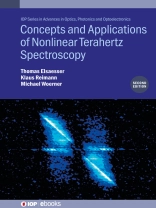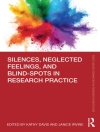Terahertz (THz) radiation with frequencies between 100 GHz and 30 THz has numerous applications in basic science, materials characterization, imaging, sensor technologies, and telecommunications. Recent progress in THz generation has provided ultrashort THz pulses with electric field amplitudes of up to several megavolts/cm. This development has opened the research field of nonlinear THz spectroscopy in which strong light-matter interactions are exploited to induce quantum excitations and/or charge transport and follow their nonequilibrium dynamics in time-resolved experiments. This book introduces the basic concepts of light-matter interactions and nonlinear optics, discusses methods of THz generation and nonlinear THz spectroscopy, and presents prototypical experimental and theoretical results in condensed matter physics and chemistry. Each chapter includes an overview of recent literature.
Key Features:
-
Introduces methods of THz generation and nonlinear THz spectroscopy in a tutorial way
-
Discusses the relevant theoretical concepts
-
Presents prototypical, experimental, and theoretical results in condensed matter physics.
-
Illustrates the potential of nonlinear THz spectroscopy by recent research, including an overview of the relevant literature.
-
Includes a new chapter with insight into basic molecular phenomena.
Содержание
Preface
Acknowledgements
Author biographies
Symbols
1 Introduction
2 Terahertz technology
3 Nonlinear light-matter interactions
4 Methods of nonlinear terahertz spectroscopy
5 Nonlinear terahertz spectroscopy of solids
6 Nonlinear THz spectroscopy of molecular systems
Об авторе
Thomas Elsaesser is a director emeritus at the Max-Born-Institute, Berlin, Germany, and a retired full professor for experimental physics at Humboldt University, Berlin. His research has focused on ultrafast phenomena in condensed matter, including (bio)molecular systems, inorganic solids, and nanostructures.
Klaus Reimann was from 1999 to 2024 a scientist at the Max-Born-Institute, Berlin, Germany, in the field of ultrafast mid-infrared and THz spectroscopy. Before this he worked in the field of semiconductors under high pressures.
Michael Woerner is a department head at the Max-Born-Institute, Berlin, Germany, and holds a lecturer qualification (Habilitation) in physics at Humboldt University, Berlin. His research focuses on ultrafast phenomena in solids and nanostructures.












